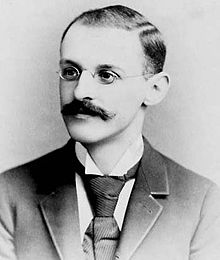Abraham Flexner

Abraham Flexner (November 13, 1866 – September 21, 1959) was an American educator, best known for his role in the 20th century reform of medical and higher education in the United States and Canada.
After founding and directing a college-preparatory school in his hometown of Louisville, Kentucky, Flexner published a critical assessment of the state of the American educational system in 1908 titled The American College: A Criticism. His work attracted the Carnegie Foundation to commission an in-depth evaluation into 155 medical schools in the US and Canada. It was his resultant self-titled Flexner Report, published in 1910, that sparked the reform of medical education in the United States and Canada. Flexner was also a founder of the Institute for Advanced Study in Princeton, which brought together some of the greatest minds in modern times to collaborate on intellectual discovery and research.
Quotes
[edit]- Curiosity, which may or may not eventuate in something useful, is probably the outstanding characteristic of modern thinking.
- Flexner, Abraham, The Usefulness of Useless Knowledge. Harper’s Magazine. Issue 179, June / November 1939, p. 545.
- In the face of the history of the human race what can be more silly or ridiculous than likes or dislikes founded upon race or religion?
- Flexner, Abraham, The Usefulness of Useless Knowledge. Harper’s Magazine. Issue 179, June / November 1939, p. 550.
- A poem, a symphony, a painting, a mathematical truth, a new scientific fact, all bear in themselves all the justification that universities, colleges, and institutes of research need or require.
- Flexner, Abraham, The Usefulness of Useless Knowledge. Harper’s Magazine. Issue 179, June / November 1939, p. 550.
- Science, like the Mississippi, begins in a tiny rivulet in the distant forest. Gradually other streams swell its volume. And the roaring river that bursts the dikes is formed from countless sources.
- Flexner, Abraham, The Usefulness of Useless Knowledge. Harper’s Magazine. Issue 179, June / November 1939, p. 549.
- Thus it becomes obvious that one must be wary in attributing scientific discovery wholly to any one person. Almost every discovery has a long and precarious history. Someone finds a bit here, another a bit there. A third step succeeds later and thus onward till a genius pieces the bits together and makes the decisive contribution.
- Flexner, Abraham, The Usefulness of Useless Knowledge. Harper’s Magazine. Issue 179, June / November 1939, p. 549.
See also
[edit]- Institute for Advanced Study
- Abraham Flexner quote about War
External links
[edit]- Wikimedia Commons category
- "The Usefulness of Useless Knowledge", courtesy of the Institute for Advanced Study.

